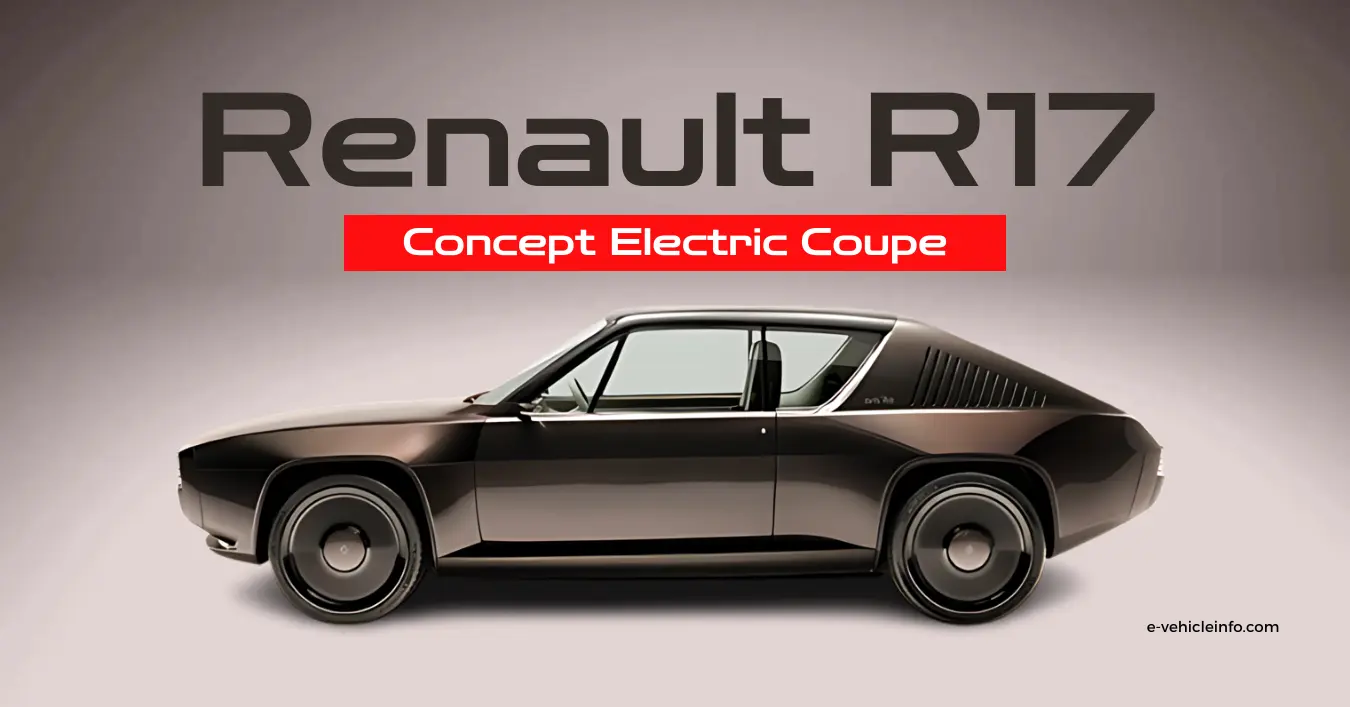
The concept car captured everyone’s attention with its iconic looks and strong performance.
Now, Renault has revived this beloved classic with the R17 electric restomod, a collaboration with French designer Ora Ïto.
The New Renault R17 Restomod- Classic Electric Coupe Unveiled on 4 September at Maison5 in Paris, the R17 electric restomod x Ora Ïto will be on display on the Renault stand at the Paris Motor Show, between 14 and 20 October.
This all-electric reinterpretation preserves the original’s fastback, two-door design but swaps out the 1.6-litre engine for a modern 270 (199 kW) BHP electric motor, offering a range of 248 miles.
This combination of retro design and cutting-edge technology makes the R17 restomod a standout showcase.
French Designer Ora Ïto says,
“We kept the most distinctive design features of Renault 17, starting with the front end. My aim was to add style and flow, but without altering the character of R17,” explained the designer.
“You can still see the original Renault 17 and its sports coupe looks. I wanted to add my own design codes, accentuating some of the characteristics with a futuristic touch to give them a more timeless look. We teleported Renault 17 into the future, making a few subtle changes that give it a whole new look. “I wanted to wrap Renault 17 in a second skin to glorify it and bring it up to date using my own style.”
It blends the nostalgic design of the 1971 Renault 17 with a new carbon-fiber chassis for enhanced aerodynamics.
Although Renault has not revealed exact performance specs, the R17 weighs about 1.4 tonnes, which is similar to the current Megane RS. While it won’t be racing to production, this design serves as a reflection of the brand’s electric ambitions.
While much of the R17’s body remains true to the original design, Renault has updated the interior with modern technology. It retains classic features such as the original doors, windows, and underbody, but introduces a new, more comfortable seating arrangement.
The interior is equipped with four screens for navigation and driver information, and the rear seats have honeycombed backrests for added comfort.
Additionally, the seats are upholstered with a combination of Merino wool and thick bouclé, designed to evoke a luxurious feel.
Inside the cabin, Ora Ïto’s influence is clear with its furniture-inspired design and soft materials that evoke comfort.
The neo-rectangular steering wheel, honeycomb-designed backrests, and rectangular navigation screens add to the mix of retro charm and futuristic tech.
Even with these updates, the car still manages to stay true to the aesthetic roots of the 1970s Renault 17.
However, modern touches have been added, including LED lighting that spans the entire width of the vehicle, a single taillight, and a muscular stance enhanced by wider arches that accommodate larger wheels. These features are complemented by the car’s sleek, aerodynamic body finished in a unique galactic brown color.
Though Renault did not reveal specific performance metrics like acceleration, the R17 restomod has been engineered for better handling with wider dimensions—now 17 cm broader than the original—while maintaining its fastback profile.
The use of a monocoque platform from the original R17 ensures structural integrity while embracing electric technology.
While Renault has made it clear that this R17 restomod will not enter production, but the company plans to unveil the R17 at the Paris Motor Show in October.
Alongside this, Renault plans to introduce the electric R4 and continue its retro-inspired series that started with the R5.
The R17 electric restomod stands as a fusion of the past and future, blending nostalgia with modern performance, even if it’s just a design experiment for now.
This post was last modified on September 13, 2024 5:40 pm
In a major stride toward sustainable mobility, the Himachal Pradesh Police have incorporated six custom-modified Tata Curvv electric vehicles into…
In India, the automotive and transport industry is undergoing significant changes. This transformation isn't just about improving roads and infrastructure;…
Montra Electric, the clean mobility brand from the prestigious Murugappa Group, has launched the All-New Super Auto, a next-generation electric…
Union Minister Nitin Gadkari (Minister of Road Transport and Highways of India) has once again made a bold statement that’s got…
India’s electric four-wheeler (E4W) market slowed in September 2025, following a record-breaking August, with 15,038 units sold, representing an 18%…
India’s EV market hit 1,04,056 electric two-wheeler sales in September 2025. TVS, Bajaj, and Ather led the chart, while Ola…
This website uses cookies.